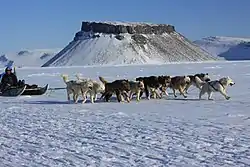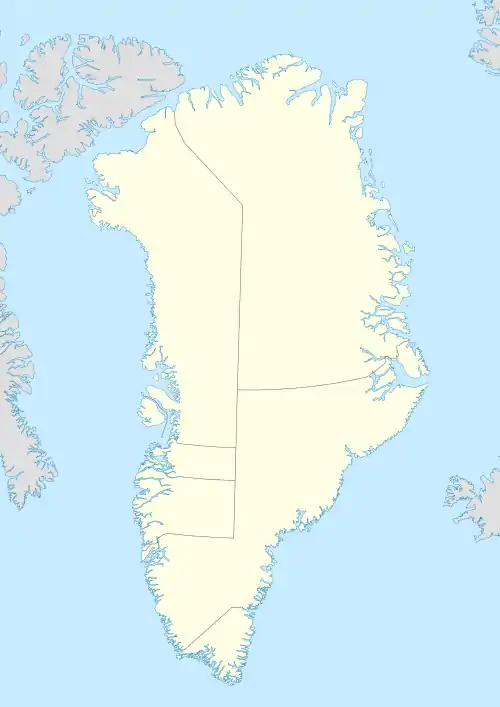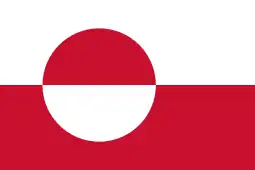Pituffik
Pituffik is a former settlement in northern Greenland, located at the eastern end of Bylot Sound by a tombolo known as Uummannaq, near the current site of the American Pituffik Space Base, formerly Thule Air Base. The former inhabitants were relocated to the present-day town of Qaanaaq. The relocation and the fallout from the 1968 Thule Air Base B-52 crash in the vicinity are a contentious issue in Greenland's relations with Denmark and the United States.
Pituffik | |
|---|---|
 The tombolo known as Uummannaq | |
 Pituffik Location within Greenland | |
| Coordinates: 76°32′N 68°45′W | |
| State | |
| Constituent country | |
| Municipality | Avannaata |
| Relocated | 1953 |
| Time zone | UTC-04 |
Exploration
Pituffik was a hunting village of the Greenlandic Inuit. The Qaanaaq region of northern Greenland in which it is located was inhabited for several thousand years, first settled 4,500 years ago by the Paleo-Eskimo peoples migrating from the Canadian Arctic.[1]
The area was explored by Commander James Saunders of the Royal Navy while wintering on HMS North Star in 1849-50 after being trapped by the ice in the sound.[2]
Military control
Forced relocation
In 1951 the United States was given permission to build Thule Air Base at the site of the settlement. Between 1952 and May 1953, all residents of Pituffik and nearby Dundas (Uummannaq) were forcibly relocated 130 km (81 mi) north to the new town of Qaanaaq, commonly known at the time as "New Qaanaaq" or "New Thule",[3][4] where people were forced to live in tents from May 1953 until November of the same year, well into the polar winter, while the 27 new houses were constructed for them.[4][5] The total cost of the relocation amounted to 8.65 million Danish krone (DKK), or 1.52 million US dollars, with more than half covered by the American side.[5]
The airbase is not part of any civilian municipality of Greenland, but an enclave within Greenland, outside of its jurisdiction. Within Greenland the airbase location, and the airbase itself, continue to be referred to as Pituffik, in memory of the old settlement. Access to the site is restricted, with travellers bound for Thule Air Base required to apply for access permit from either Rigsombudsmanden in Nuuk (residents of Greenland), or the Danish Foreign Ministry (all others). Failure to present the permit during check-in results in denial of boarding. The same rules apply for transfers at Pituffik, including a stopover on the way from Qaanaaq to Savissivik, the southernmost settlement of northern Greenland, on the shore of Melville Bay.[6]
Plutonium contamination
Radioactive plutonium from the 1968 bomber crash contaminated the nearby ancient hunting grounds, affecting the livelihoods of the region's inhabitants.[3][7][8] There is evidence of hairless fur seals, and muskoxen with deformed hooves;[7] the pollution remaining a contentious issue between Greenland, Denmark, and the United States.[7][8][9]
Legal action over civilian relocations
While the protection of Greenland offered by the airbase is not disputed,[10] the relocation of the 1950s remains a controversial issue in Greenland more than half a century later, with ongoing demands for land reclamation being proposed by Greenlandic politicians.[7] The current Government of Greenland does not have influence over the continued existence of the airbase at the site, as foreign policy remains as prerogative of the Government of Denmark. From mid-1980s onwards the then Greenland Home Rule government worked together with the Government of Denmark to resolve the social effects of the eviction. On 30 September 1986 Denmark and the U.S agreed to reduce the area outside Greenland's jurisdiction to half of the original size.[5] In 1997 the Danish government agreed to subsidize the construction of the Qaanaaq Airport (47 million DKK), in agreement with the Home Rule government.[5]
On 28 November 2003 the Danish Supreme Court ruled on the relocation issue denying the residents of Qaanaaq the right to return to the former village in Pituffik.[7] The Greenlanders, numbering 428 in the case, were represented by the Hingitaq 53 group.[5] That decision was later appealed in the European Court of Human Rights.[7] The Court unanimously declared the application inadmissible.[11]
Internal debate in Greenland also concerned demands to force the airbase to pay lease fees for its use of the land.[12]
The National Space Institute at the Technical University of Denmark operates the Thule Research Station at Pituffik, which is crewed up to two months a year.[13]
Climate
| Climate data for Dundas 1961-1975 | |||||||||||||
|---|---|---|---|---|---|---|---|---|---|---|---|---|---|
| Month | Jan | Feb | Mar | Apr | May | Jun | Jul | Aug | Sep | Oct | Nov | Dec | Year |
| Record high °C (°F) | 4.0 (39.2) |
5.0 (41.0) |
3.0 (37.4) |
4.6 (40.3) |
10.3 (50.5) |
14.5 (58.1) |
17.2 (63.0) |
17.0 (62.6) |
11.0 (51.8) |
5.4 (41.7) |
5.7 (42.3) |
3.5 (38.3) |
17.2 (63.0) |
| Average high °C (°F) | −18.5 (−1.3) |
−18.4 (−1.1) |
−19.4 (−2.9) |
−12.2 (10.0) |
−2.0 (28.4) |
4.1 (39.4) |
7.0 (44.6) |
6.6 (43.9) |
1.3 (34.3) |
−5.5 (22.1) |
−12.0 (10.4) |
−17.6 (0.3) |
−7.2 (19.0) |
| Average low °C (°F) | −28.2 (−18.8) |
−28.1 (−18.6) |
−28.5 (−19.3) |
−22.1 (−7.8) |
−9.8 (14.4) |
−2.0 (28.4) |
0.7 (33.3) |
0.9 (33.6) |
−4.0 (24.8) |
−11.7 (10.9) |
−19.9 (−3.8) |
−25.6 (−14.1) |
−14.9 (5.3) |
| Record low °C (°F) | −39.5 (−39.1) |
−39.0 (−38.2) |
−40.5 (−40.9) |
−35.6 (−32.1) |
−25.2 (−13.4) |
−9.5 (14.9) |
−4.0 (24.8) |
−6.3 (20.7) |
−19.6 (−3.3) |
−31.2 (−24.2) |
−34.5 (−30.1) |
−38.0 (−36.4) |
−40.5 (−40.9) |
| Average precipitation mm (inches) | 6 (0.2) |
8 (0.3) |
4 (0.2) |
7 (0.3) |
7 (0.3) |
8 (0.3) |
20 (0.8) |
25 (1.0) |
19 (0.7) |
13 (0.5) |
9 (0.4) |
8 (0.3) |
134 (5.3) |
| Average precipitation days (≥ 1 mm) | 1.5 | 1.5 | 1.1 | 2.0 | 2.3 | 1.9 | 3.8 | 4.4 | 3.8 | 3.5 | 2.7 | 2.0 | 30.5 |
| Average snowy days | 4.0 | 4.0 | 3.8 | 3.5 | 3.9 | 2.3 | 1.1 | 1.5 | 4.8 | 6.4 | 5.7 | 5.3 | 46.3 |
| Source: http://www.dmi.dk/fileadmin/user_upload/Rapporter/TR/2000/tr00-18.pdf | |||||||||||||
See also
- High Arctic relocation
- Diego Garcia, the civilian population was removed in the 1970s to create a US Airforce Base in this British Indian Ocean Territory atoll
References
- Fortescue, Michael. Language Relations Across Bering Strait: Reappraising the Archaeological and Linguistic Evidence. Open Linguistic Press, Cassell, 1998. ISBN 0-304-70330-3
- Icy Imprisonment: The 1849 Voyage of the HMS North Star Archived May 2, 2016, at the Wayback Machine
- Ehrlich, Gretel (2001). This Cold Heaven: Seven Seasons in Greenland. Random House. pp. 143, 176, 222. ISBN 978-0-679-75852-5.
- "Greenland Collector Vol.8, No.2, May 2003". Post Greenland. Retrieved 16 July 2010.
- "Denmark -- HINGITAQ 53 vs. Denmark, Application No. 18584/04". Environmental Law Alliance Worldwide. Retrieved 16 July 2010.
- "Transportation to Pituffik". Air Greenland. Archived from the original on 10 April 2016. Retrieved 6 September 2016.
- O'Carroll, Etain (2005). Greenland and the Arctic. Lonely Planet. pp. 199–200. ISBN 1-74059-095-3.
- "Kræver alt frem". Sermitsiaq (in Danish). 2 February 2010. Archived from the original on 13 February 2013. Retrieved 16 July 2010.
- "Udvalg rystet over hemmeligholdelse". Sermitsiaq (in Danish). 12 November 2010. Archived from the original on 20 July 2012. Retrieved 16 July 2010.
- "Afdæmpet missildebat". Sermitsiaq (in Danish). 5 December 2006. Archived from the original on 17 July 2012. Retrieved 16 July 2010.
- "HINGITAQ 53 vs. Denmark, Application No. 18584/04 (decision from European Court of Human Rights as to admissibility of application)". Environmental Law Alliance Worldwide (ELAW). Retrieved 10 November 2018.
- "Atassut vil have pris på Pituffik". Sermitsiaq (in Danish). 23 November 2007. Archived from the original on 26 January 2008. Retrieved 16 July 2010.
- "Thule Research Station, Technical University of Denmark | Isaaffik". www.isaaffik.org. Retrieved 2019-12-18.
